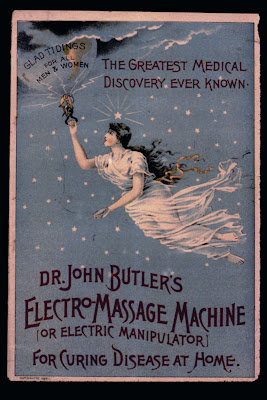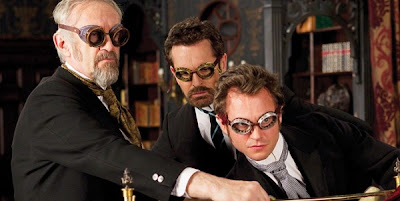The plot of this small independent film is a fictionalized account of the creation and distribution of the personal vibrator, an appliance that unbelievably has it’s roots in 19th Century England and was actually designed to abate the symptoms of female hysteria. Hysteria was considered a real condition during that time period and was assigned to troubled women (a quarter of the female population) who must then be driven to orgasm. Seriously.
I would suggest that everyone do a little Wikipedia search for ‘female hysteria’ because it’s some of the most entertaining and offbeat information I’ve ever heard. Doctors and midwives used to ‘massage’ women into orgasms (yes, male doctors and female midwives—how’s that for Victorian homoeroticism) to help with their anxiety, loss of appetite and even insomnia. During this period, it seems hard to believe that no one started some sort of morality campaign against the doctors who were pleasuring their wives in the name of science, but there you have it, folks. The fact that the entire European and American medical establishment willfully ignored the obvious logical conclusions about female sexuality (you know, that women like, need and enjoy sex just as much as men do) is both tragic and hilarious at the same time.
 |
| One hopes that this advertisement for an ‘Electro-Massage Machine’ was a bit tongue in cheek |
One would believe then (or at least I did) that a film about such a ‘tragic and hilarious’ situation like female hysteria would be both comedic and portray some of the complications and harm that affected women because of these early medical beliefs. This of course leads to my fallen expectations: Hysteria was at most sweet and lighthearted, though from my viewpoint, naïve and lacking in any real substance.
Despite it’s very feminist-looking trailer and plot, the film still centers around the men who invent the vibrator and is, at it’s core, a romantic comedy with the guy getting the girl at the end of the day. The film lacks any kind of subtlety in the political messages that’s it’s pushing, nor does it expound upon complexities or gray areas. Maggie Gyllenhaal portrays the fiery, feminist, saintly Maggie Dalrymple who is a very positive representation of a ‘feminist’ character, though is what I would call Hollywood feminist ‘lite’: a glossy stereotype who strangely has few lines and a lack of screen time. Felicity Jones is prim and proper like a good English girl and then does an abrupt about-face into an independent modern woman just like a good character should, but without much struggle or enthusiasm. Hugh Dancy is the brilliant doctor, dashing but dull, who in a surprisingly original ending still saves the day and Maggie Gyllenhaal (sarcasm).
 |
| Maggie Gyllenhall and Hugh Dancy |
There are some redeeming characters though: a lusty prostitute turned housemaid named ‘Molly the Lolly’ and Rupert Everett as the wealthy eccentric inventor who steals the show with his dialogues about the queen and the telephone (make of that what you will).
 |
| Sheridan Smith as Molly the Lolly and a vibrator |
However, the movie is well made, well acted, with some clever dialogues and funny situations, which is really too bad because the plot and the idea of the movie had some incredible potential. While I know that not every movie needs to be The Hours, Hysteria was about as original as my title for this piece. The problem of the film is instead of exploring some of the more problematic and comedic situations, the film took the safe, clichéd route and left itself sweet, but mediocre.
 |
| The first test of the vibrator with Jonathon Pryce, Rupert Everett, and Hugh Dancy |
Rachel Redfern has an MA in English literature, where she conducted research on modern American literature and film and its intersection, however she spends most of her time watching HBO shows, traveling, and blogging and reading about feminism.

You summed up my thoughts about this film. It’s a funny one and I suppose it should be taken purely as a comedy, but don’t recall anyone in it bringing up the other British cure for hysteria, clitoridectomies which were performed both surgically and sometimes with cauterization as a cure for masturbation (besides the usual female manias), sometimes on very young girls. This dude : http://www.ncbi.nlm.nih.gov/pubmed/12263443
This one definitely did not live up to its potential. None of the characters had any depth imo,which i suppose ties in to your complaint about it lacking real substance
Exactly. There’s so much that’s problematic and complex about the topic and it led to so many problems in the future…I had expected at least some small discussion about those things. And I never realized that they performed clitoridectomies during that period…it’s too bad that didn’t take the movie any further than a very shallow reading.
I agree with you, Rachel. This film had so much potential, and I was excited to see it, but it definitely did not live up to my expectations. It was so safe! Maggie Gyllenhall’s character has a bit of the “manic pixie dream girl” bit going, even if she is a feminist character, and, you’re right: the film was a romantic comedy about a group of men and their “kooky invention,” and how one gets the girl in the end.
By the way, lol at that poster: “The greatest medical discovery ever known.”